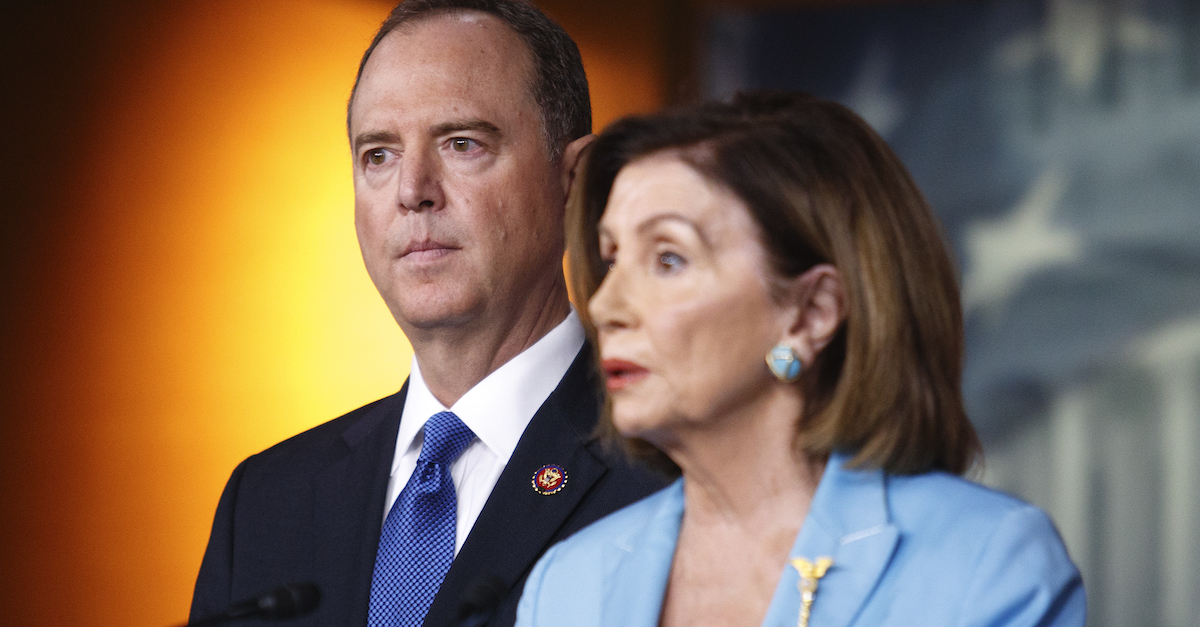
While most of the media has been focused on the Ukrainian-flavored national security aspect of impeachment, one conservative attorney says the House of Representatives’ decision to charge President Donald Trump with Obstruction of Congress is far more significant.
Writing in USA Today, Paul Rosenzweig argues that the House’s second charge is the weightier of the two drafted articles against Trump. Rosenzweig previously worked with occasional impeachment fan Kenneth Starr and is a co-founder of the conservative and libertarian group of legal scholars and lawyers known as Checks & Balances. The group was founded to defend the rule of law in the Trump era.
The op-ed makes the case by invoking constitutional history:
Our Founders’ goal was to create a limited government, but one that was energetic enough to actually be effective. As constitutional scholar Herbert Storing once put it, the intent was for “a design of government with the powers to act and a structure to make it act wisely and responsibly.” To advance that goal, the Framers set up a system of checks and balances, where the branches of government had oversight of each other and prevented abuse by protecting their own prerogatives. Thus, they hoped, the separation of powers would frustrate the lust for power.
“And so, the most important choice the House made is to charge the president with obstruction of Congress in its second proposed article of impeachment,” the op-ed continues. “Trump’s decision to completely stonewall the House — to withhold documentation from Congress during its impeachment investigation and to order witnesses not to testify — is nothing less than an assault on the checks and balances at the core of the American system.”
Rosenzweig’s argument is a largely novel take—at least amongst the legal pundit class. House Democrats agreed on just two articles of impeachment as part of their narrowly focused efforts to hold Trump accountable—based on the proposition that voters care deeply about the diplomatic minutiae of arms sales and military aid intended to shore up Western hegemony in the Donbass at Russia’s expense.
After reaching a high-point just after proceedings began, public support for Trump’s impeachment and removal has consistently waned, according to opinion polling. As those numbers plummeted, critics lambasted House Speaker Nancy Pelosi’s narrow focus on the Ukraine issue.
The argument being made by Rosenzweig, however, cuts through all that geopolitical noise. Instead of a see-sawing map of Russia and the Ukraine, the outline advanced here is based on America’s own Constitution.
Rather than focusing on Trump’s withholding of aid to the Ukraine and openly expressed hopes for investigations of Joe Biden and Hunter Biden, Rosenzweig hones in on the White House’s serial attempts to keep congressional investigators all-but in the dark.
And that, so the argument goes, cuts to the quick of what’s truly at stake as the House moves toward the impending vote on impeachment—even as some Democrats have begun to waver in support of the historical charge against the 45th president.
The obstruction issue is distilled later on:
Trump’s gravest offenses have been to reject limits on his authority and deny the ability of Congress to oversee his actions. When he says of the Constitution, “Then I have an Article 2, where I have the right to do whatever I want as president,” Trump is striking at the very heart of American democracy. In recommending an article of impeachment for obstructing Congress, the House is making the critical, essential choice to reaffirm its role as a co-equal branch of government charged with the solemn duty of restraining executive overreach.
Obstruction of Congress is historically a rarely enforced offense that even the body itself is generally loath to pretend to care much about. But when the president does it, Rosenzweig argues, it’s a full-frontal assault on the moving glue that keeps the American system of government functioning in line with the way said system was long ago conceived.
“To put the fundamental problem succinctly, we are no longer sure that adequate powers exist to ensure that a president adheres to the rule of law, and to punish any abuses of power that come to light,” Rosenzweig writes. “And if our powers are no longer adequate, what can be done?”
Per the author, there’s only one answer here and that answer is specifically provided for in the U.S. Constitution.
[image via Tom Brenner/Getty Images]